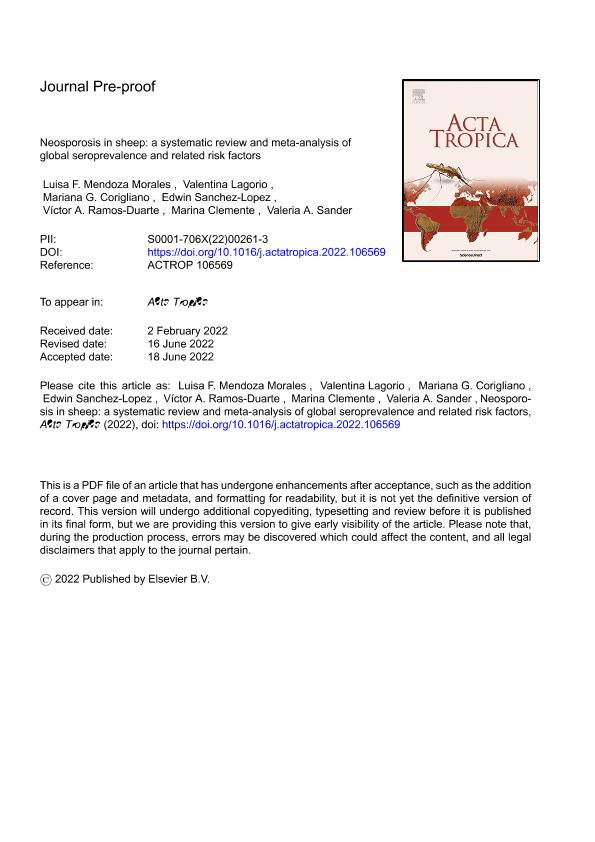Mostrar el registro sencillo del ítem
dc.contributor.author
Mendoza Morales, Luisa Fernanda

dc.contributor.author
Lagorio, Valentina

dc.contributor.author
Corigliano, Mariana Georgina

dc.contributor.author
Sánchez López, Edwin Fernando

dc.contributor.author
Ramos Duarte, Víctor Andrés

dc.contributor.author
Clemente, Marina

dc.contributor.author
Sander, Valeria Analía

dc.date.available
2023-11-06T12:12:07Z
dc.date.issued
2022-06
dc.identifier.citation
Mendoza Morales, Luisa Fernanda; Lagorio, Valentina; Corigliano, Mariana Georgina; Sánchez López, Edwin Fernando; Ramos Duarte, Víctor Andrés; et al.; Neosporosis in sheep: A systematic review and meta-analysis of global seroprevalence and related risk factors; Elsevier Science; Acta Tropica; 233; 6-2022; 1-66
dc.identifier.issn
0001-706X
dc.identifier.uri
http://hdl.handle.net/11336/217049
dc.description.abstract
Neosporosis is recognized as the main cause of abortions in cattle worldwide and there is an increasing concern about its role in ovine reproductive losses; however, epidemiological studies regarding neosporosis in sheep are still limited. This meta-analysis aimed to estimate the global pooled seroprevalence and associated risk factors of ovine neosporosis. In the current report, a comprehensive strategy of search and data collection from 7 worldwide databases was performed. A final set of 73 studies (80 datasets) published from 2000 to 2021 were selected based on inclusion criteria, comprising data on 35,740 sheep (corresponding to 37,565 evaluated samples) from 30 countries worldwide. The global pooled seroprevalence of Neospora caninum infection in sheep estimated by the random-effects model was 13% (95% CI, 10-15) and showed high heterogeneity (Q = 5147.15, I2 = 98%, p< 0.001). Furthermore, by meta-analyses of subgroups it was demonstrated for the first time that seroprevalence significantly varied between continents (highest in Africa; 20%, 95% CI, 4-44), WHO regions (highest in African Region; 42%, 95% CI, 36-48), countries (highest in Colombia; 79%, 95% CI, 61-92%) and diagnostic methods (highest by IFAT; 17%, 95% CI, 12-23). Meta-regression indicated significant increasing trends in the prevalence of ovine neosporosis with decrease in geographical latitude (coefficient = -0.013; p<0.001), whereas longitude did not influence it (coefficient = -0.001; p=0.365). Regarding associated risk factors, older sheep were more likely to be infected with N. caninum than younger ones (OR 1.42; 95% CI 1.08–1.87), and sheep bred under intensive or semi-intensive systems resulted less susceptible to be seropositive than those bred under extensive system (OR 0.65; 95% CI 0.42-0.99 and OR 0.74; 95% CI 0.62–0.89, respectively). Conversely, no apparent association was found between seroprevalence and other variables, such as sex (OR 1.06; 95% CI 0.9–1.24), the presence of dogs on the farm (OR 1.15; 95% CI 0.63–2.12) or the presence of abortion (OR 1.80; 95% CI 0.87–3.74). In conclusion, the seroprevalence of ovine neosporosis is widely and heterogeneously distributed throughout the world, and it is negatively associated with increasing geographical latitude. In addition, age and extensive production system represent risk factors, which suggest that the horizontal transmission route is relevant for this host species. It is recommended to pay more attention to this disease and emphasize the global need for more indexed studies concerning the seroprevalence and risk factors of ovine neosporosis to better understand the epidemiology of this coccidian infection.
dc.format
application/pdf
dc.language.iso
eng
dc.publisher
Elsevier Science

dc.rights
info:eu-repo/semantics/openAccess
dc.rights.uri
https://creativecommons.org/licenses/by-nc-sa/2.5/ar/
dc.subject
EPIDEMIOLOGY
dc.subject
META-ANALYSIS
dc.subject
NEOSPOROSIS
dc.subject
ODDS RATIO
dc.subject
OVINE
dc.subject
OVIS ARIES
dc.subject
PREVALENCE
dc.subject.classification
Ciencias Veterinarias

dc.subject.classification
Ciencias Veterinarias

dc.subject.classification
CIENCIAS AGRÍCOLAS

dc.title
Neosporosis in sheep: A systematic review and meta-analysis of global seroprevalence and related risk factors
dc.type
info:eu-repo/semantics/article
dc.type
info:ar-repo/semantics/artículo
dc.type
info:eu-repo/semantics/publishedVersion
dc.date.updated
2023-11-01T11:11:16Z
dc.journal.volume
233
dc.journal.pagination
1-66
dc.journal.pais
Países Bajos

dc.journal.ciudad
Amsterdam
dc.description.fil
Fil: Mendoza Morales, Luisa Fernanda. Consejo Nacional de Investigaciones Científicas y Técnicas. Centro Científico Tecnológico Conicet - La Plata. Instituto de Investigaciones Biotecnológicas. Instituto de Investigaciones Biotecnológicas "Dr. Raúl Alfonsín" (sede Chascomús). Universidad Nacional de San Martín. Instituto de Investigaciones Biotecnológicas. Instituto de Investigaciones Biotecnológicas "Dr. Raúl Alfonsín" (sede Chascomús); Argentina
dc.description.fil
Fil: Lagorio, Valentina. Consejo Nacional de Investigaciones Científicas y Técnicas. Centro Científico Tecnológico Conicet - La Plata. Instituto de Investigaciones Biotecnológicas. Instituto de Investigaciones Biotecnológicas "Dr. Raúl Alfonsín" (sede Chascomús). Universidad Nacional de San Martín. Instituto de Investigaciones Biotecnológicas. Instituto de Investigaciones Biotecnológicas "Dr. Raúl Alfonsín" (sede Chascomús); Argentina
dc.description.fil
Fil: Corigliano, Mariana Georgina. Consejo Nacional de Investigaciones Científicas y Técnicas. Centro Científico Tecnológico Conicet - La Plata. Instituto de Investigaciones Biotecnológicas. Instituto de Investigaciones Biotecnológicas "Dr. Raúl Alfonsín" (sede Chascomús). Universidad Nacional de San Martín. Instituto de Investigaciones Biotecnológicas. Instituto de Investigaciones Biotecnológicas "Dr. Raúl Alfonsín" (sede Chascomús); Argentina
dc.description.fil
Fil: Sánchez López, Edwin Fernando. Consejo Nacional de Investigaciones Científicas y Técnicas. Centro Científico Tecnológico Conicet - La Plata. Instituto de Investigaciones Biotecnológicas. Instituto de Investigaciones Biotecnológicas "Dr. Raúl Alfonsín" (sede Chascomús). Universidad Nacional de San Martín. Instituto de Investigaciones Biotecnológicas. Instituto de Investigaciones Biotecnológicas "Dr. Raúl Alfonsín" (sede Chascomús); Argentina
dc.description.fil
Fil: Ramos Duarte, Víctor Andrés. Consejo Nacional de Investigaciones Científicas y Técnicas. Centro Científico Tecnológico Conicet - La Plata. Instituto de Investigaciones Biotecnológicas. Instituto de Investigaciones Biotecnológicas "Dr. Raúl Alfonsín" (sede Chascomús). Universidad Nacional de San Martín. Instituto de Investigaciones Biotecnológicas. Instituto de Investigaciones Biotecnológicas "Dr. Raúl Alfonsín" (sede Chascomús); Argentina
dc.description.fil
Fil: Clemente, Marina. Consejo Nacional de Investigaciones Científicas y Técnicas. Centro Científico Tecnológico Conicet - La Plata. Instituto de Investigaciones Biotecnológicas. Instituto de Investigaciones Biotecnológicas "Dr. Raúl Alfonsín" (sede Chascomús). Universidad Nacional de San Martín. Instituto de Investigaciones Biotecnológicas. Instituto de Investigaciones Biotecnológicas "Dr. Raúl Alfonsín" (sede Chascomús); Argentina
dc.description.fil
Fil: Sander, Valeria Analía. Consejo Nacional de Investigaciones Científicas y Técnicas. Centro Científico Tecnológico Conicet - La Plata. Instituto de Investigaciones Biotecnológicas. Instituto de Investigaciones Biotecnológicas "Dr. Raúl Alfonsín" (sede Chascomús). Universidad Nacional de San Martín. Instituto de Investigaciones Biotecnológicas. Instituto de Investigaciones Biotecnológicas "Dr. Raúl Alfonsín" (sede Chascomús); Argentina
dc.journal.title
Acta Tropica

dc.relation.alternativeid
info:eu-repo/semantics/altIdentifier/doi/http://dx.doi.org/10.1016/j.actatropica.2022.106569
Archivos asociados
